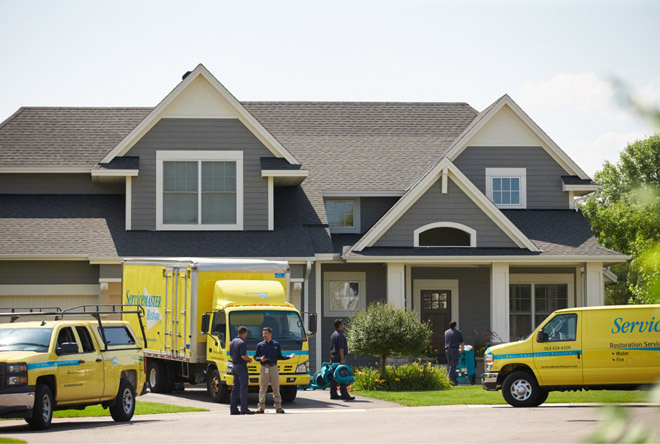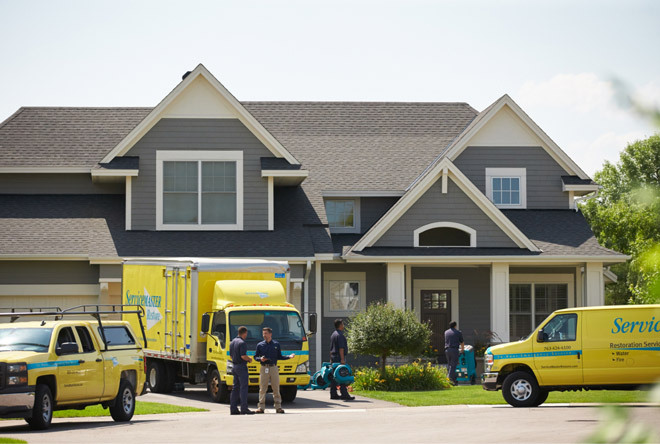Water Damage Restoration in Fort Wayne, IN
Effective Water Damage Repair Near You
Water damage can be a major problem for any homeowner. It can cause extensive property damage, health risks, and even financial losses if not taken care of properly. Water damage is caused by many factors such as floods, broken pipes or appliances, roof leaks, and more.
In order to prevent further destruction from water-related disasters it’s important to understand what causes water damage and how you can mitigate the effects of it before disaster strikes your home or business.
ServiceMaster Monroe Restorationis the nation's leading provider of water damage restoration. We work hard to ensure a prompt resolution to all of your water issues.
Our professionals are certified and well versed in the industry's best practices which allow us to provide efficient, reliable, quality work quickly and accurately - making ServiceMaster Monroe Restoration your go-to choice for all water damage needs.
Not sure where water is entering your home? Our Fort Wayne water restoration experts will figure it out - call (260) 233-9823 or reach out online.
What Causes Water Damage?
The most common causes of water damage include
- flooding due to heavy rains or storms
- leaking roofs
- burst pipes
- faulty plumbing systems
- appliance malfunctions (such as dishwashers)
- sewage backups
- foundation cracks allowing moisture in from outside sources
- poor drainage causing standing pools of stagnant water on your property
All these situations require immediate attention in order for homeowners not only save their properties but also protect themselves against potential health hazards associated with long-term exposure to dampness & moisture buildup inside the building structure itself which eventually may lead into structural damages too!
What are the Types of Water Damage?
Water damage is typically categorized into three main categories and further classified into four classes based on the damage's severity and the evaporation rate. These categories and classes are used to assess the extent of damage and determine appropriate mitigation and restoration measures:
Categories of Water Damage:
- Category 1 - Clean Water: This category involves water damage from a clean and sanitary source. It poses the least risk to health. Examples include broken water supply lines, sink or tub overflows, and rainwater. Category 1 water is considered safe initially, but it can become more contaminated if it comes into contact with other materials.
- Category 2 - Grey Water: Grey water contains a moderate level of contamination that may cause discomfort or illness if ingested or exposed to. It typically comes from washing machines, dishwashers, and shower or sink drains. Grey water may contain detergents or chemicals but does not contain fecal matter. If not addressed promptly, grey water can deteriorate into category 3 (black water).
- Category 3 - Black Water: Black water is highly contaminated and can pose serious health risks. It typically originates from sources like sewage backups, flooding from rivers or streams, or water from toilets with fecal matter. Black water contains various harmful microorganisms and potentially hazardous chemicals. Restoration efforts involving black water should be handled by professionals with the necessary safety precautions due to the significant health risks it presents.
Classes of Water Damage:
In addition to categories, water damage is classified into different classes based on the rate of evaporation and the affected materials:
- Class 1: This class involves the least amount of water, affecting only a small area. It typically involves materials with low porosity, like concrete or hardwood.
- Class 2: Class 2 water damage affects a larger area, with water absorption into materials with medium porosity, such as carpets or drywall.
- Class 3: In this class, water damage is characterized by the highest rate of evaporation, affecting a substantial area. Materials with high porosity, like insulation or plaster, are often impacted.
- Class 4: Class 4 water damage involves materials with very low porosity, such as hardwood or concrete. These materials require specialized drying techniques and equipment to address water damage effectively.
Understanding both the category and class of water damage is essential for assessing the scope of the damage, determining the appropriate restoration measures, and ensuring the safety and habitability of the affected property.
If you have any questions or have experienced water damage in your home, please don't hesitate to contact us. Our team is always ready to assist you in any way we can.
Call (260) 233-9823 today or contact us online for water damage restoration services in Fort Wayne, IN.
How Long Does Water Damage Restoration Take?
The timeline of our water damage restoration process is largely dependent on the size and severity of the affected area. While some restoration projects may take as little as a few days, others can require weeks or months to return to a safe and healthy condition.
We understand that every situation is urgent and time is of the essence - that's why we take pride in providing same-day service and 24/7 availability. Throughout the entire process, our highly trained technicians are available to answer questions and provide updates on progress.
What is Water Mitigation?
Water mitigation is the process of preventing further water damage and minimizing its impact on a property after a water intrusion event. It involves a series of actions taken immediately following the event to control the water source, extract standing water, and dry out the impacted areas.
The key objectives of water mitigation are:
- Stop the flow of water: This may involve turning off the water supply, repairing leaks, or covering open windows and doors.
- Remove standing water: Water is extracted using pumps, wet vacuums, and other equipment to prevent it from spreading and causing further damage.
- Dry out affected areas: This involves using dehumidifiers, fans, and other drying techniques to remove moisture from walls, floors, carpets, and other materials.
- Prevent mold growth: Mold grows in humid environments, so it's crucial to dry out affected areas quickly and thoroughly to prevent its growth.
- Protect property and belongings: Valuable belongings and furniture affected by water are moved to a safe location to minimize damage.
Water mitigation is a critical step in the restoration process after any water damage event. It can help minimize damage, prevent mold and mildew growth, and protect the health and safety of your loved ones.
Benefits of water mitigation:
- Reduced insurance costs: Taking prompt action to mitigate water damage can lower your insurance premiums by demonstrating proactive steps to minimize risk.
- Faster restoration process: Efficient water mitigation helps dry out affected areas quickly, allowing restoration work to begin sooner and minimizing downtime.
- Salvaged belongings: Prompt water removal can minimize damage to furniture, documents, and other belongings, saving you money on replacements.
- Improved air quality: Mold growth can release harmful spores into the air, impacting the health of occupants. Water mitigation helps prevent mold and promotes a healthier indoor environment.
If you experience water damage in your property, it's crucial to act fast and contact a professional water mitigation service. They will assess the situation, take the necessary steps to stop the water flow, remove standing water, and begin the drying process.
Don't let water damage disrupt your life. Act quickly and contact ServiceMaster Monroe Restoration today for prompt and professional water mitigation services.
We offer 24/7 emergency response and are ready to help minimize damage and restore your property.
Water mitigation is key to stopping water in its tracks - let our experts help by calling(260) 233-9823 or contact us online!
Why Should Homeowners Hire a Professional Water Restoration Company?
Hiring an experienced restoration company when dealing with significant water-related damages will ensure that all aspects of the job are completed correctly—including proper removal & disposal methods, and proper cleaning methods that keep your items intact (unless it’s been too damaged by water).
Not only does this help reduce costs overall but more importantly, helps keep people safe throughout the entire ordeal too--which should always come first.
In the Face of Disaster, Trust ServiceMaster
By working with ServiceMaster Monroe Restoration, you get all the above plus the restoration methods are backed by a brand with 65 years of experience of restoring homes like yours. In addition, we take a compassionate approach in the work we do, because we understand the sentimental connection we have to our homes. For us, customer satisfaction is our #1 priority!
ServiceMaster by Monroe Restoration - Ft. Wayne provides all aspects of water damage restoration, from water cleanup to drying and dehumidifying. Get started by calling (260) 233-9823 or reach out online!



